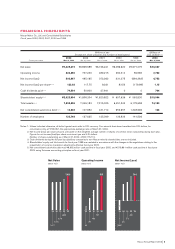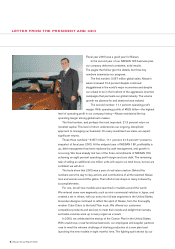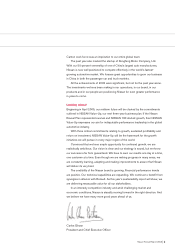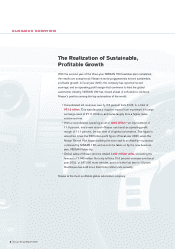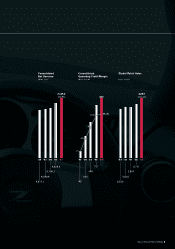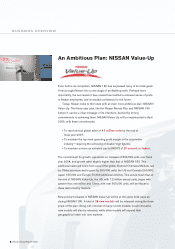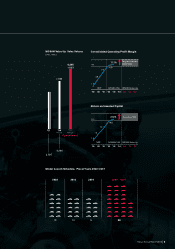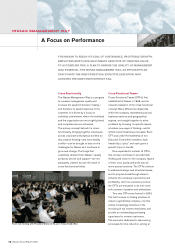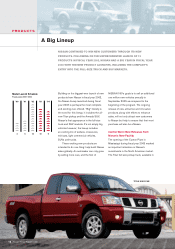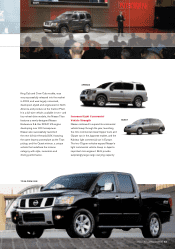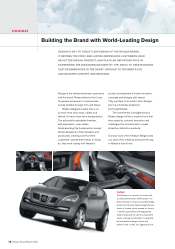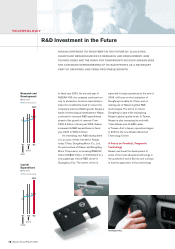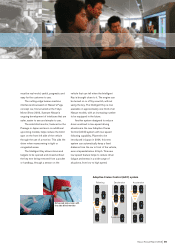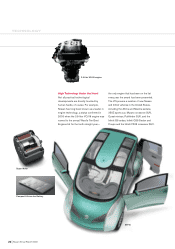Nissan 2004 Annual Report Download - page 13
Download and view the complete annual report
Please find page 13 of the 2004 Nissan annual report below. You can navigate through the pages in the report by either clicking on the pages listed below, or by using the keyword search tool below to find specific information within the annual report.
Nissan Annual Report 2003 11
increased customer value and higher
company performance.
V-up Program
The V-up Program is a tool designed
specifically to help management find the
solutions to reach NISSAN 180 goals. It is
cross-functional across departments,
and is designed so that quantifiable results
can be obtained.
To date, a total of 2,950 V-up projects
have been initiated; these have created
total savings for the company of ¥33 billion.
Two-Way Communications
One of the key factors in the Nissan
Management Way has been two-way
communications between management
and employees—increasing transparency,
building trust and accelerating the sharing
of best practices.
Delegating Authority
Nissan is known for its innovation, and its
ability to do things in an original way.
At the same time, decisions must also be
made based on a constant standard to
assure consistency while improving
efficiency and speed.
To create this clear standard for
decision making, Nissan has created the
Delegations of Authority standard. It is a
management tool that helps to identify the
players involved in a decision by clarifying
responsibilities, while also assisting in
identifying the policies, procedures and
rules that may be linked to the decision.
This eliminates the time wasted by
redefining players whenever a decision
must be made. Delegation of Authority is
now in use in Japan and North America,
and will be implemented throughout Nissan
in Europe and other markets—making it a
global, yet customized marketing tool.
Basic Corporate Governance Policy
and Status of Implementation
Basic Policy regarding
Corporate Governance
Corporate governance is an important
responsibility of management, and its
most important role is to clarify the
responsibilities of Nissan’s management
team. At Nissan, clear management
objectives and policies are published
for the benefit of shareholders and
investors, and achievements and results
are announced early and with as
much transparency as possible. The
enhancement of corporate governance by
full and fair disclosure is the responsibility
of management.
The Company’s organization
and systems for internal control
Nissan operates under the dual
governance of a Board of Directors and a
Board of Corporate Auditors, both based
on the provisions of the Commercial Code
of Japan. The Board of Directors is
responsible for resolutions governing
important business decisions, while the
Board of Corporate Auditors supervises
and controls the execution of Nissan’s
most important business functions.
To strengthen the audit function, the
shareholders will be asked on June 23,
2004 to approve a resolution increasing
the number of corporate auditors from
four to five, three of whom will function
concurrently as external corporate
auditors. Furthermore, a Japan Internal
Audit Office has been established at
Nissan to conduct internal audits of
operations on a regular basis, with the
Chief Internal Audit Officer being
responsible for conducting global audits.
Thus, a three-way audit control
system has been adopted through a
combination of the Board of Corporate
Auditors, Nissan’s internal audit functions,
and the audits conducted by the
independent auditors.
Nissan has ratified its “Nissan Global
Code of Conduct” and has established a
“Global Compliance Committee” to
reinforce the implementation of
compliance with laws and ethic standards
and to prevent any illegal or unethical
conduct within the global Nissan Group.


